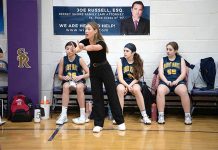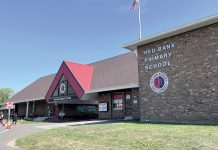By Elizabeth Wulfhorst
HOLMDEL– Seeing the night sky during a school day seems like an impossible task. But a gift from the Indian Hill Parent Liaison Group and the Village School Parent School Association, has made exploring the galaxy not only possible, but an exciting experience for some Holmdel township students.
The STARLAB portable planetarium, an approximately 10’ by 16’ inflatable contraption, holds up to 30 students at a time. According the STARLAB website, the fabric used in the dome-like structure ensures “opacity even in fully lighted rooms. The inside surface has an aluminized reflective coating designed to clearly display bright images.” Students crawl through an entrance tunnel to get into the main portion of the dome, where different astronomical images are projected.
The school had previously been renting a portable planetarium, but owning the unit allows Indian Hill School science teacher Tom Woods to teach a much more in-depth curriculum. Students in the fourth and fifth grades are taught to find the constellation Orion, learn the phases of the moon, and work to understand the intricacies of the galaxy and solar system. They also learn about new methods being used by astronomers to find planets outside our solar system.
Woods uses the planetarium to teach fifth graders about Greek and Native American mythology, helping students identify constellations that coincide with the names of mythological characters. This information is then used by the students in their English classes.
And for students, it’s fun to see in the dome what they could possibly see under a starry night sky in their own backyards. According to Indian Hill School, the STARLAB generates student engagement, allowing for rich student-teacher dialogue and a more concrete understanding of complex topics.
STARLAB provides a unique way to keep our students curious about natural phenomena,” explained Alicia Killean, Supervisor of Mathematics & Science for Holmdel Township Public Schools. “We want them to be ‘thinking like scientists,’ and developing their curiosity and sense of wonder,” she added. “Presenting them with authentic experiences such as this is one way to do that.”














